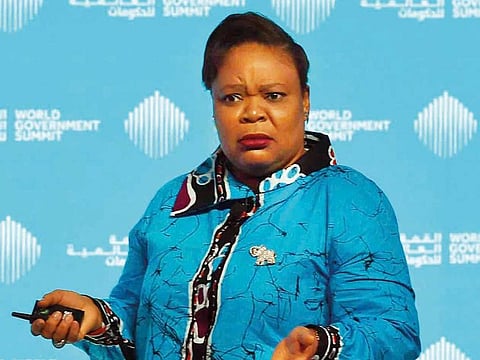‘Women’s role essential in rebuilding war-torn nations’
Nobel Laureate Leymah Gbowee says women are on frontline of conflicts

Dubai: Women can no longer be excluded from playing an essential role in legislative and constitutional processes especially during the rebuilding of peace, emphasised the session ‘The role of women in rebuilding nations,’ on the first day of the World Government Summit.
Recalling her country’s success story on Sunday, Nobel Laureate Leymah Gbowee, a Liberian peace activist, discussed the determination she needed to lead the women’s non-violent peace movement that helped end the Second Liberian Civil War in 2003.
“Women decided along with myself we were going to protest for peace-we stepped out in white, sometimes no shoes, no make up, challenging dictatorship, standing in front of AK47s, barricading different things,” she told the audience before receiving a lengthy round of applause.
The activist who spearheaded the ‘Women of Liberia Mass Action for Peace,’ highlighted that this story is not unique to women in Liberia.
“In all countries around he world affected by conflict, women everywhere are standing up and stepping out,” she added.
Often forgotten at the end of a war, women are expected to continue following traditional roles of staying in the kitchen and taking care of children, “a message that is no longer an option,” said Gbowee.
She explained that the impact of conflict on women’s life is a reflection on the society’s interactions during peace time.
Gbowee referred to an incident when she asked a soldier who fought during the Liberian Civil war if he had raped a woman before. “No, he said. I understood he did not get my questions,” she said. “Did you force any woman to have sex with you during the war in Liberia?” she repeated, a question to which the answer to was “yes!”
“Our nation would not have gone from war to peace to two successive elections and breaking a 70 year transfer of power in 2017 had it had not been for the unique skills of women,” said Gbowee.
She referred to a Liberian sing-song, which translates to; “No longer are men in front and women at the back, for men and women are walking side by side.”
Box:
Speaking at the World Government Forum’s first day, Juan Manuel Santos, Colombia’s 32 president and Nobel Peace Prize Winner, said his life’s objective is to fight for peace in Colombia after over 50 years of war. Studying 17 different peace process that have taken place in in Africa, Asia, Latin America, and in countries such as Sri Lanka, and South Africa, Santos said he identified the essential conditions that made peace possible. “I then identified the conditions in the case of Columbia and started creating them,” he said. Santos looked at military effectiveness and arm forces, relations with neighboring countries, and the need of applying transitional justice as appose to the traditional model of justice. “Traditional justice simply puts you in jail, against the transitional justice, which forces you to relate to your victims and pay back to society,” he said. The former president also referred to the need of respecting the human rights of your adversaries in order to achieve peace objectives. Looking towards the future, Santos said the country is starting the process of reconciliation, which also has to do with educating young girls and boys that through dialogue you can sort out problems.


